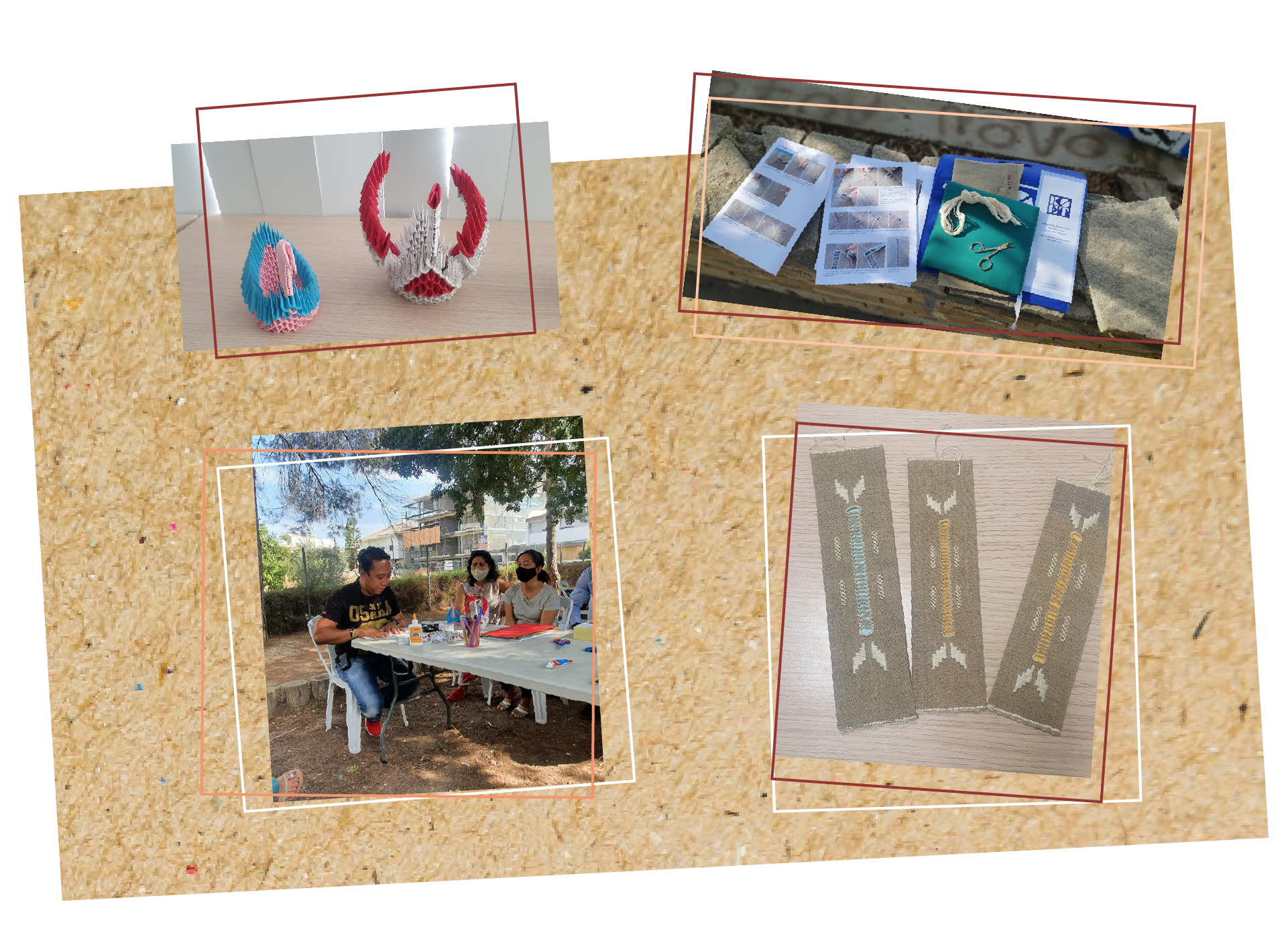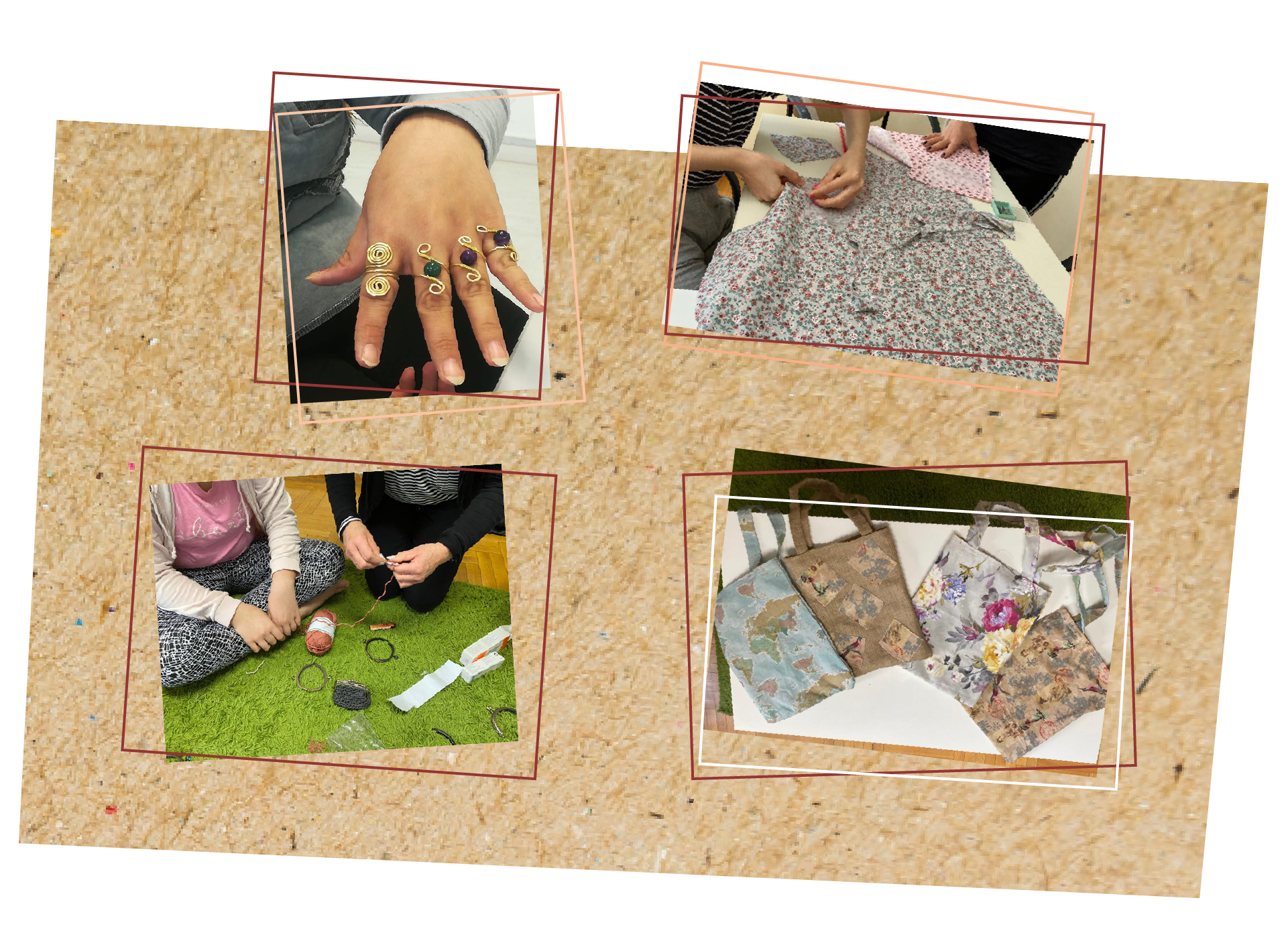My Skills
Italy
During the workshops held in Palermo, Italy, the participants shared their personal stories and stories related to their cultural heritage developing intercultural competences that will be useful for them to feel more included in the Italian society and more welcoming towards diversity in the future. Most of them were professional handcrafters, and all of them had some knowledge of handicrafts. This allowed for a very fruitful exchange of technical knowledge between them. Most of the participants were already experimenting with intercultural features in their work, for example by mixing traditionally Italian and African designs and materials. The expertise of participants was mainly in techniques such as crochet, tailoring, graphic design, visual art, handcrafting with recycling material and with miscellaneous material such as bones, wood, iron, etc. The workshops allowed them to improve both their technical skills and their creativity thanks to mutual sharing of their ideas and creative processes.
Also, in terms of future plans and entrepreneurship, participants shared very creative and feasible entrepreneurial ideas and had the opportunity to develop action plans to further elaborate on them and start planning their implementation. This, together with the creation of participants’ personal portfolios, allowed them to improve their entrepreneurial skills needed to better navigate the work environment in the future. The greatest impact of the local workshops was nonetheless the networking opportunity, as most participants were looking for connections within their work environment at the local level. A small group of participants even expressed the desire to form an intercultural collective of handcrafters to strengthen their skills, improve their ability to reach their clientele, and raise awareness on environmental issues through the use of recycled material.
UK
The majority of migrant crafters attending the local workshops in the UK came from Afghanistan, Russia, Albania, Gambia, Nigeria and Egypt. Most of them were treating craft as a hobby, but some have decided to explore it as a business option once they are able to work in the UK. The most popular crafts among the group were upcycling, paper craft, jewellery making, macramé and origami, so during the workshops the crafters created Origami butterflies, paper gift boxes, macramé plant hangers and Kindness Rocks.
The participants had a chance to learn from each other and help their peers master the crafts presented during the project. During the training, the participants also shared stories about their cultural heritage, experiences and crafts practiced in their countries. All migrant crafters from the last cohort came to the UK in 2020 as asylum seekers in search of a better life. Some of them are skilled workers, whilst some had a very basic education. However, they all found it hard to integrate with locals because of Covid restrictions and the type of accommodation they were staying in. Nevertheless, some local residents were interested in attending the last session to celebrate their achievements and the artefacts produced during the local workshops. Additionally, participating in the local workshops made them all feel better about themselves and helped to improve their mental wellbeing in the midst of the global pandemic.
Cyprus
The local workshops held in Cyprus involved migrant handcrafters (mainly from the Philippines, Iran, Africa and Nigeria) and Cypriots. All of the participants love to practice handicrafts, some of them as a hobby and some of them as a paid job. The main handicrafts that the participants practise are embroidery, weaving, leatherwork, jewellery making, paper craft, origami, etc.
Most of the participants came to Cyprus from their countries of origin, in order to live and work here, and the majority of them would like to open their own business making their handicraft work. During the local workshops, the participants; migrants and locals, and the instructors, shared their stories and their experiences related to the cultural heritage of their countries as well as their difficulties integrating in the new context. Some of them had no job in their countries, and some of them did not have a high level of education, hence the workshops conducted by GrantXpert Consulting offered an added value to all the participants, migrants and locals, since the locals were also practising their handicrafts as a hobby or as new entrepreneurs.
During the workshops in Cyprus, the participants practised two different handicraft fields; lefkaritiko lace and origami. Two experienced handcrafters showed to the participants how to practice those handicrafts, explained what materials are used and the techniques. The participants were taught how to make a bookmark from lefkaritiko lace, how to make an origami swan from the recyclable materials.
Greece
During the local workshops in Greece, local and migrant participants from countries such as Afghanistan, Somalia, Syria, Iraq, and Congo attended. Most of the attendants had no experience in handicrafts; only the participant from Iraq had previous experience in sewing because she was working in a textile company back in her country. However, all of them were more than willing to try out new things and test their skills. As they stated, they enrolled in the workshops out of curiosity, as they had a lot of spare time since they are not currently working. The main handicrafts that the participants practiced were sewing and creating pieces of jewellery.
All of the participants fled from their countries as refugees and they landed in Greece looking for a new place to live and work. The majority of them found the workshops really fascinating and interesting, thus they think of establishing the newly acquired skills as their future work in order to boost their career prospect possibilities. During the local workshops, the participants had the opportunity to meet new people and get in touch with them. They stated that they enjoyed socializing and exchanging their ideas or past experiences with the other attendants. At this point, we should point out that participants had very low knowledge of the Greek or the English language. However, they felt motivated and found themselves having a great time, so they were perfectly communicating with each other.
To sum up, the positive outcomes of this workshop were that all the migrant participants revealed that they liked and are ready to start creating more and more extraordinary things and they wish to develop this craft activity professionally in the near future.
Lithuania
During the local workshops in Lithuania, migrants from Armenia, Lebanon, Russia, Ukraine, Poland and Russia, and locals belonging to national minorities were involved. During the training, participants shared their stories and experiences related to the cultural heritage of their countries. Most of the participants have been living in Lithuania for many years and they have already become accustomed to local people and traditions. Also, the cultural heritage of some countries does not differ much from Lithuania, so it was not difficult for people to adapt in Lithuania. Most of the participants had already tried handicrafts, especially knitting and crocheting. Other participants had not practiced their handicraft skills (e.g. carving or design of postcards) for a very long time. These handicraft products can be made from sheets of paper, remnants of decorative ribbons, they do not require expensive materials. During the workshops, participants exchanged knitting experiences, made cut-outs and used them on windows or decorated postcards, and prepared Christmas cards.














